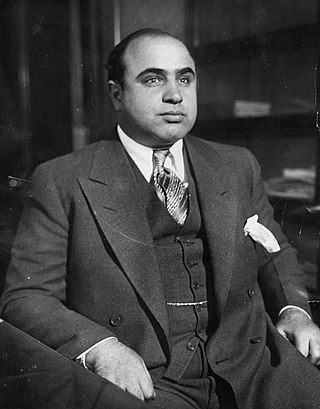
Alphonse Gabriel Capone, sometimes known by the nickname "Scarface", was an American gangster and businessman who attained notoriety during the Prohibition era as the co-founder and boss of the Chicago Outfit from 1925 to 1931. His seven-year reign as a crime boss ended when he went to prison at the age of 33.

Prohibition is the act or practice of forbidding something by law; more particularly the term refers to the banning of the manufacture, storage, transportation, sale, possession, and consumption of alcoholic beverages. The word is also used to refer to a period of time during which such bans are enforced.

The Eighteenth Amendment to the United States Constitution established the prohibition of alcohol in the United States. The amendment was proposed by Congress on December 18, 1917, and ratified by the requisite number of states on January 16, 1919. The Eighteenth Amendment was repealed by the Twenty-first Amendment on December 5, 1933—the only constitutional amendment in American history to be repealed.

The National Prohibition Act, known informally as the Volstead Act, was an act of the 66th United States Congress designed to execute the 18th Amendment which established the prohibition of alcoholic drinks. The Anti-Saloon League's Wayne Wheeler conceived and drafted the bill, which was named after Andrew Volstead, chairman of the House Judiciary Committee, who managed the legislation.

Isidor "Izzy" Einstein (1880–1938) and Moe W. Smith (1887–1960) were United States federal police officers, agents of the U.S. Prohibition Unit, who achieved the most arrests and convictions during the first years of the alcohol prohibition era (1920–1925). They were known nationally for successfully shutting down illegal speakeasies and for using disguises in their work.

Vincent Drucci, also known as "The Schemer", was an American mobster during Chicago's Prohibition era who was a member of the North Side Gang, Al Capone's best known rivals. A friend of Dean O'Banion, Drucci succeeded him by becoming co-leader. He is the only American organized crime boss to have been killed by a policeman.
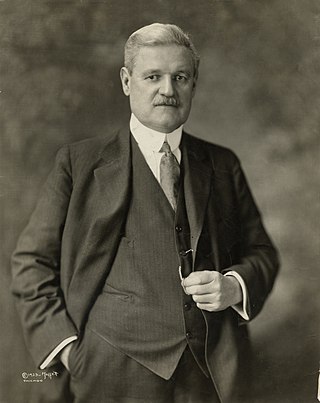
William Emmett Dever was an American politician. He was the mayor of Chicago from 1923 to 1927. He had previously served as a judge and before that an alderman. As an alderman and judge he would work to become the Democratic candidate for mayor for over two decades.
The Bureau of Prohibition was the United States federal law enforcement agency formed to enforce the National Prohibition Act of 1919, commonly known as the Volstead Act, which enforced the 18th Amendment to the United States Constitution regarding the prohibition of the manufacture, sale, and transportation of alcoholic beverages. When it was first established in 1920, it was a unit of the Bureau of Internal Revenue. On April 1, 1927, it became an independent entity within the Department of the Treasury, changing its name from the Prohibition Unit to the Bureau of Prohibition. In 1930, it became part of the Department of Justice. By 1933, with the repeal of Prohibition imminent, it was briefly absorbed into the FBI, or "Bureau of Investigation" as it was then called, and became the Bureau's "Alcohol Beverage Unit," though, for practical purposes it continued to operate as a separate agency. Very shortly after that, once repeal became a reality, and the only federal laws regarding alcoholic beverages being their taxation, it was switched back to Treasury, where it was renamed the Alcohol Tax Unit.

The Pineapple Primary was the name given to the primary election held in Illinois on April 10, 1928. The campaign was marked by numerous acts of violence, mostly in Chicago and elsewhere in Cook County. In the six months prior to the primary election, 62 bombings took place in the city, and at least two politicians were killed. The term "Pineapple Primary" originates with the contemporary slang term "pineapple" to describe a hand grenade.
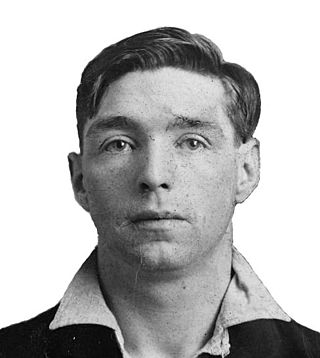
Owen Vincent "Owney" Madden was an American gangster who was a leading underworld figure in New York during Prohibition. Nicknamed "The Killer", he garnered a brutal reputation within street gangs and organized crime. He ran the Cotton Club in Manhattan and was a leading boxing promoter. After increased attention from law enforcement in New York, Madden moved to Hot Springs, Arkansas, in 1935, where he remained until his death from natural causes in 1965.
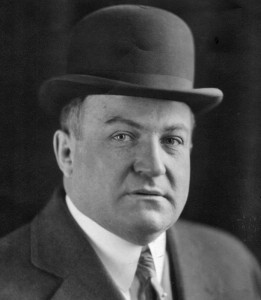
George Remus was a German-born American lawyer who was a bootlegger during the early days of Prohibition, and later murdered his wife Imogene.

The Untouchables were special agents of the U.S. Bureau of Prohibition led by Eliot Ness, who, from 1930 to 1932, worked to end Al Capone's illegal activities by aggressively enforcing Prohibition laws against his organization. Legendary for being fearless and incorruptible, they earned the nickname "The Untouchables" after several agents refused large bribes from members of the Chicago Outfit.

Roger Touhy was an Irish American mob boss and prohibition-era bootlegger from Chicago, Illinois, in the United States. He is best remembered for having been framed by his rivals in Chicago organized crime for the fake 1933 kidnapping of Jewish-American organized crime figure and Chicago Outfit associate John "Jake the Barber" Factor, a brother of cosmetics manufacturer Max Factor Sr.. Despite numerous appeals and at least one Federal court ruling freeing him, Touhy spent 26 years in prison until he was finally exonerated and released in November 1959. In retaliation for filing a lawsuit against acting boss Tony Accardo and other senior Mafiosi, Touhy was murdered in an alleged contract killing by the Chicago Outfit less than a month after his release.

Wayne Bidwell Wheeler was an American attorney and longtime leader of the Anti-Saloon League. The leading advocate of the prohibitionist movement in the late 1800s and early 1900s, he played a major role in the passage of the Eighteenth Amendment to the United States Constitution, which outlawed the manufacture, distribution, and sale of alcoholic beverages.
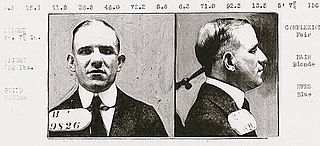
Michael "Mickey" Duffy -- also known as John Murphy and George McEwen -- was a Polish-American mobster and rival of Maxie "Boo Boo" Hoff during Prohibition. He became one of the most famous and powerful beer bootleggers in Philadelphia and Atlantic City.

Roy Olmstead was one of the most successful and best-known bootleggers in the Pacific Northwest region during American Prohibition. A former lieutenant in the Seattle Police Department, he began smuggling alcohol from Canada while still on the force. Following his arrest for that crime, he lost his job in law enforcement and turned to illegally importing and distributing alcohol as a full-time and highly profitable occupation. Eventually, wiretaps of his phones provided sufficient evidence for his arrest and prosecution, despite an appeal that reached the Supreme Court regarding the legality of the wiretap.

The Prohibition era was the period from 1920 to 1933 when the United States prohibited the production, importation, transportation and sale of alcoholic beverages. The alcohol industry was curtailed by a succession of state legislatures, and finally ended nationwide under the Eighteenth Amendment to the United States Constitution, ratified on January 16, 1919. Prohibition ended with the ratification of the Twenty-first Amendment, which repealed the Eighteenth Amendment on December 5, 1933.

Charles Dean O'Banion was an American mobster who was the main rival of Johnny Torrio and Al Capone during the brutal Chicago bootlegging wars of the 1920s. The newspapers of his day made him better known as Dion O'Banion, although he never went by that first name. He led the North Side Gang until 1924, when he was shot and killed, reportedly by Frankie Yale, John Scalise and Albert Anselmi.

Rum-running in Windsor, Ontario, Canada, was a major activity in the early part of the 20th century. In 1916, the State of Michigan, in the United States, banned the sale of alcohol, three years before prohibition became the national law in 1919. From that point forward, the City of Windsor, Ontario was a major site for alcohol smuggling and gang activity.

Joseph Lonardo, also known as "Big Joe", was a Sicilian emigrant to the United States who became the first crime boss of the Cleveland crime family, which he structured from a number of competing organized crime gangs. When national Prohibition began in 1920, Lonardo became a dealer in corn sugar, an essential ingredient in the manufacture of corn whiskey. Lonardo became a "sugar baron" by driving other legitimate corn sugar merchants out of business, encouraging home distillation, and using intimidation, murder, and theft to eliminate or drive his criminal competitors out of business.


















